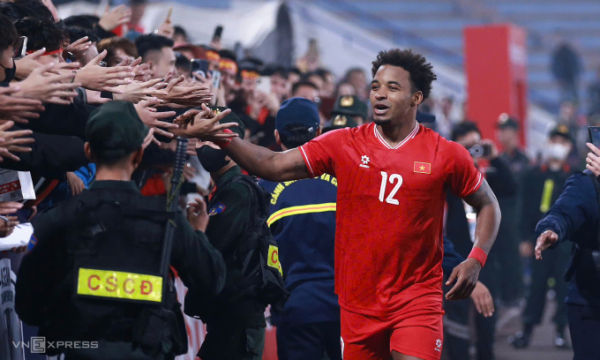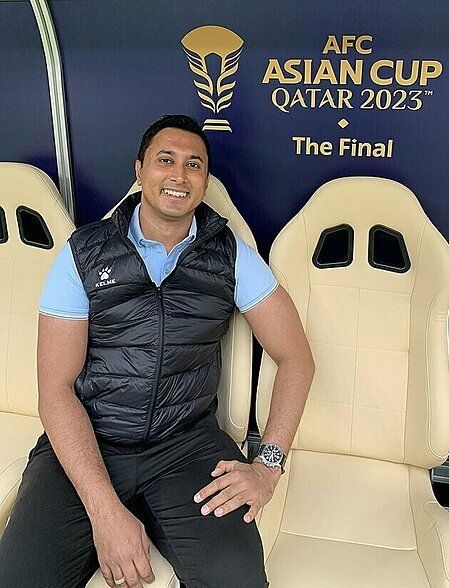
“Xuan Son will definitely improve the quality of the Vietnamese national team,” Rai told Read. “He is the right choice to lead the attack with his finishing ability and technique to get past defenders. Vietnam excel at creating chances and Xuan Son is the type of player who can capitalize on them.”
Xuan Son, born Rafaelson Bezerra Fernandes, has played in Vietnam for five years and was naturalized before being called up for the 2024 ASEAN Cup. He made a stunning debut in the final Group B match, scoring twice and providing two assists in Vietnam’s 5-0 victory over Myanmar at Viet Tri Stadium. His performance earned him a perfect 10 rating from Sofascorea first for a Vietnamese player.
On Thursday, in the first leg of the semifinals against Singapore, Son was once again the man of the match. After a stunning goal that was later disallowed by VAR, he directly brought a penalty to Vietnam in injury time, which Nguyen Tien Linh converted. A few minutes later, he scored to seal the 2-0 victory for the team.
However, Son’s naturalization sparked controversy. While the Brazilian-born striker has expressed a deep commitment to Vietnam and resides with his family in Nam Dinh Province, a recent Read poll found that 30% of nearly 2,000 readers opposed the national team’s push for naturalized players.
Former Vietnam national women’s football coach Steve Darby shared this opinion.
“Xuan Son is undoubtedly good, but relying on naturalized players is a short-term solution,” Darby said. “Domestic strikers like Nguyen Tien Linh already struggle for playing time in the V. League due to foreign players and now their opportunities with the national team are further reduced.”
|
Steve Darby as an assistant coach of Mumbai City FC in India in 2014. Photo courtesy of Steve Darby |
Darby also raised concerns about the reliability of naturalized players. “What if one day they feel homesick and want to return? I’ve seen this happen often with Brazilian players,” he added.
Naturalization is not uncommon in football. Many naturalized players have played in the World Cup, such as Polish-born strikers Miroslav Klose and Lukas Podolski (Germany), Brazil’s Eduardo da Silva (Croatia), and the legendary Alfredo Di Stefano, who was born in Argentina but played for Spain.
France famously won the 1998 World Cup with naturalized stars like Marcel Desailly, Lilian Thuram and Patrick Vieira, many of whom were born in former colonies of France and integrated into French football systems from a young age.
In Southeast Asia, Singapore’s naturalization policy played a vital role in their AFF Cup (now ASEAN Cup) victories in 2004, 2007 and 2012, with players like defenders Daniel Bennett, Precious Emuejeraye, midfielders Fahrudin Mustafic, Shi Jiayi, and strikers Itimi Dickson, Aleksandar Duric.
However, when the policy was tightened over the past decade, Singaporean football faced a decline.
“Naturalization can hinder the development of local players,” Darby said. “Naturalized players often play as mercenaries, motivated by financial incentives. It’s different when a player has a blood connection to the country they represent.”
 |
|
Rhysh Rai as a commentator at the 2023 AFC Asian Cup in Qatar. Photo courtesy of Rhysh Rai |
At the 2024 ASEAN Cup, Singapore fielded two naturalized players, Kyoga Nakamura and Song Ui-young, both of whom have lived in Singapore for years and expressed genuine commitment to the nation. According to Rai, it is true that Singapore has focused on short-term success and neglected the development of young players.
“The Football Association of Singapore is now more selective about naturalization,” Rai, who used to be an official commentator at the Asian Cup, noted.
FIFA mandates that naturalized players must reside in a country for at least five years before representing its national team. Several foreign players in the V. League meet this requirement, including Janclesio (31, Becamex Binh Duong), Gustavo (29, Thanh Hoa FC), Geovane Magno (30, Hong Linh Ha Tinh) and Michael Olaha (28, Song Lam Nghe An).